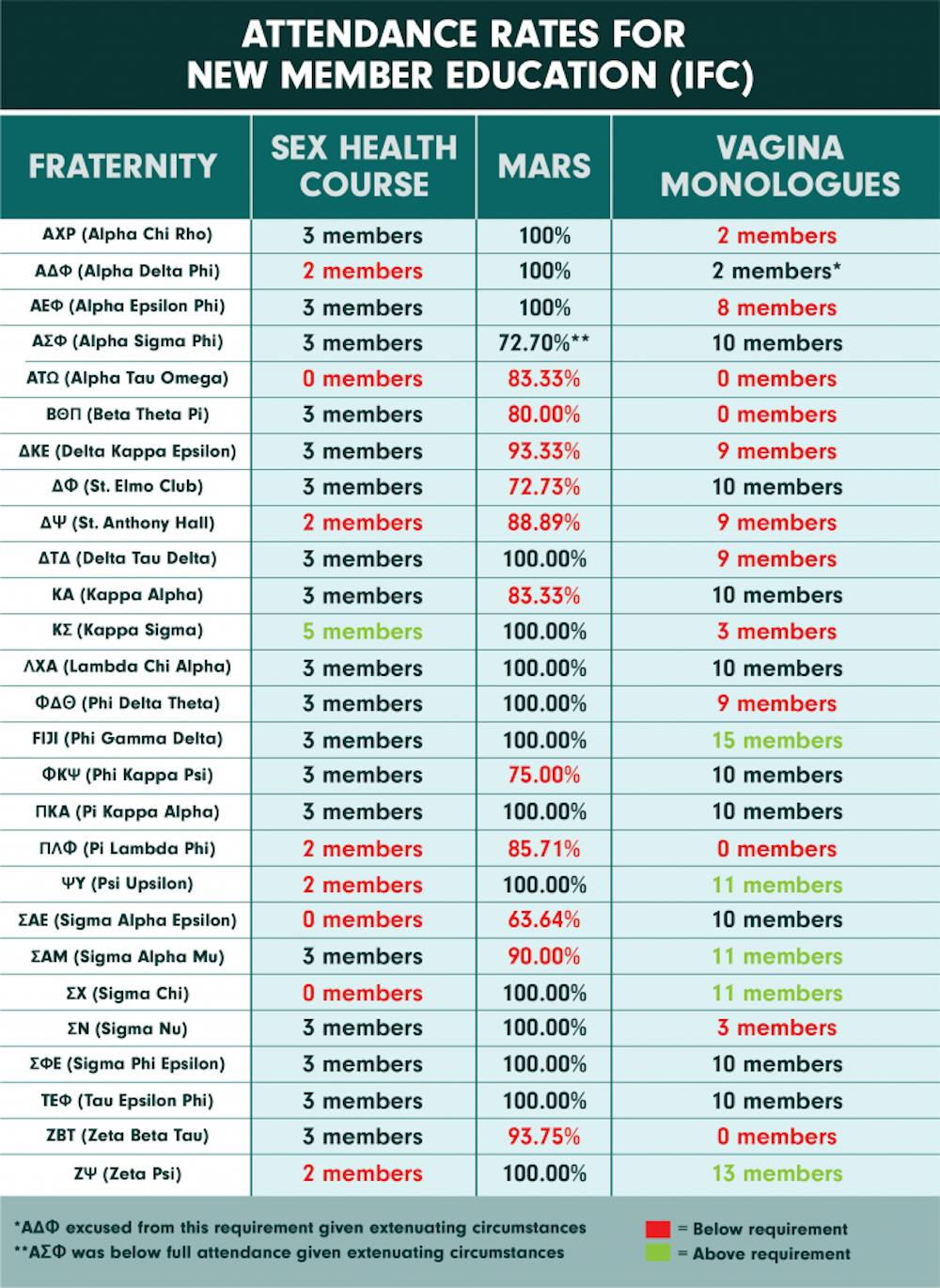
For the first time, the Interfraternity Council is publicly publishing fraternities' attendance rates for various educational programs, including courses on sexual assault prevention and sexual health. Only five of Penn's 27 fraternities fulfilled the requirements for all three educational events that were mandated.
New member education is a type of IFC educational programming concerning sexual health and sexual assault, which all on-campus fraternities are expected to complete.
This year, chapters were required to send three new members to a sexual health education course hosted by Student Health Service, 10 to the Vagina Monologues and have 100 percent attendance for a Men Against Rape and Sexual Assault presentation.
Bradley Freeman, the president of IFC and College senior, said he decided to publish the attendance rates from last semester for "accountability and transparency."
Only five fraternities fulfilled all three requirements. Nearly 30 percent did not have three member's attend SHS's "sex camp" on sexual health, and roughly 40 percent did not have full attendance at their MARS presentation. More than 50 percent did not have the requisite number of members attend the Vagina Monologues.
Alpha Tau Omega President and Wharton senior Frederick Dunau did not respond to a request for comment. ATO was one of three chapters that had zero members attend SHS's "sex camp."
This was the first year that the Vagina Monologues was a mandatory event for fraternity members and the IFC purchased tickets for its attendees.
George Costidis, a member of Pi Kappa Alpha and College sophomore, said last year's new member education helped to spark conversations about typically “taboo” topics.
“There are lots of obstacles that I don’t face as a man,” said Costidis. “Hearing other people’s stories about them really opened my eyes to how I can make sure to prevent those kinds of things from happening to other people.”
IFC excused Alpha Delta Phi from the requirements for the Vagina Monologues and sex health course because of the fraternity’s small pledge class.
Zeta Beta Tau was one of four fraternities that had zero members at the Vagina Monologues. ZBT President and College and Wharton junior Matt Schiff did not respond to a request for comment.

Wharton senior Nico DeLuna, IFC Vice President of New Member Education and Recruitment, said that in prior years, MARS held two presentations and chapters were expected to send their members to either session. This year, MARS members presented at individual chapter houses.
“The fact that we changed [new member education] last year so you could schedule your own meetings at your own chapter house at your own convenience, there is no excuse for why the requirements should not be completed,” he said.
IFC excused Alpha Sigma Phi from the MARS requirement because the fraternity was under investigation and University sanctions prevented them from holding member-wide meetings.
President of Pi Lambda Phi and College junior Peter Carzis said in an email that his fraternity’s incomplete attendance at the MARS presentation was due to scheduling conflicts. He declined to comment on the fact that not one Pilam member attended the Vagina Monologues.
President of MARS and a College senior Zeeshan Mallick said that while his organization wants as many people to attend MARS's presentations as possible, he understands that certain factors, such as a small pledge class, can lower attendance percentages.
DeLuna added that in calculating the attendance, there were issues of members not signing in or buying their own tickets, but that the IFC adjusted for discrepancies after talking to the chapter presidents.
President of Sigma Alpha Epsilon and Wharton junior Joel Fonseca did not respond to a request for comment. SAE was one of 12 fraternities that had less than full attendance at the MARS presentation.
The IFC can fine chapters that do not fulfill the requirements. Carzis said in an email that Pilam paid a fine of $100 for sending no members to the Vagina Monologues. A chapter can also lose accreditation points, which allow them to remain chartered and stay on campus.
Director of the Office of Fraternity and Sorority Life Eddie Banks-Crosson said encouraging attendance in the program is based more on incentives than penalties. However, fraternities that skip mandatory events can face social sanctions, which can include limits to the number of parties they organize.
DeLuna said implementing social sanctions was difficult last year because scheduling the MARS presentations took longer than expected. He added that he didn't personally know of any social sanctions that have been imposed as a result of fraternities skipping mandatory events.
“Honestly, there isn’t a ton that the IFC can do to chapters that don’t complete the requirements,” said DeLuna. “Which is one reason why we decided to publish the data this year… if the rest of the school can see who is taking this seriously and who isn’t, perhaps that will be the actual social incentive to complete the requirements.”
Editor's note: A previous version of this article stated that only five of 27 fraternities completed a mandatory program for sexual assault prevention. Only one of the events under the program, run by MARS was specifically targeted towards sexual assault prevention; the other two were not. The Daily Pennsylvanian regrets the error.
The Daily Pennsylvanian is an independent, student-run newspaper. Please consider making a donation to support the coverage that shapes the University. Your generosity ensures a future of strong journalism at Penn.
Donate







